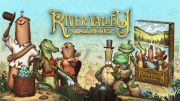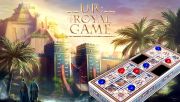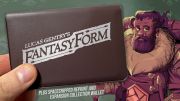River Valley Glassworks (AllPlay) – Each turn, you play a game piece from your supply to the river tile that is marked with that shape of piece. You then then collect all the pieces from one of the adjacent tiles. You store the pieces you draft in your shop, placing them in columns of matching pieces. The order of the river tiles changes after each player's turn. At the end of the game, you score points for rows and columns of pieces in your shop, but not all of them; only the two highest columns of pieces in each player's shop score points, with columns further to the right being worth more points.
Casual Game Crowdfunding: Rivers, Flames, and War

This month brings games of cozy critters and wrathful factions. A classic co-op is getting the legacy treatment while an even older game is getting a modern update. There are also two microgames for solo gaming fans this month.
Flash Point: Legacy of Flame (Indie Boards and Cards) – The classic firefighting cooperative board game, Flash Point: Fire Rescue, is getting the legacy treatment with Legacy of Flame. In this game, players use action points to move around the board to extinguish flames and rescue victims, as the fire advances each turn. If too many victims are lost or the building collapses, the players lose the game. The legacy version will include a story, new mechanics and maps, and players will unlock new equipment and abilities.
Wroth (Chip Theory Games) – Each player will choose one of the factions and race to be the first to score 40 points by moving and attacking units around the board. At the start of each round, the dice are rolled, with each die showing different actions. Players then take turns drafting those dice. Actions can include gaining resources, combat, deploying troops to the board, or moving troops. Players can also choose to exchange two dice for any one single action. Players take turns resolving their dice, and after all dice have been spent, the map is checked. Players score points for each region they have the most troops in, scoring bonus points if they are the only ones with troops in a region. Different regions are also worth a different number of points.
UR: The Royal Game (Spartan Development d.o.o.) – Each player has two four-sided dice and seven game pieces. The board is divided into three sections: six spaces making up the heaven area, two spaces to form the bridge, and 12 for the earth. Different spaces have unique functions in the game. On your turn, depending on what you roll, you can move a piece or spawn a piece onto the board (the location depends on your roll). You can defeat an opponent's piece by moving onto its space. Having your pieces occupying specific spaces on the board gives you special abilities. You win the game by having your pieces on all four of the fort spaces on the board. The board is double-sided so that you can play with the more traditional rules, or with a modern reimagining of them which gives players more strategic options.
Quests Over Coffee (Gabe Barrett) – This is a compact little solo game that takes seven minutes to play and is set in a fantasy coffee shop that also offers quests. Each turn, you draw a quest card and roll the dice. The quest card lists what happens based on what is rolled. However, during the game, the player can acquire items and hire companions which will help him to mitigate the dice as well as give special abilities. Different environments you visit will also alter the game as you play, and there is an optional variant where the goal is to defeat a boss monster at the end.
FantasyForm (Button Shy Games) – In this solo, fantasy adventure that fits inside a wallet, you are an alchemist competing against a dangerous rival. There are always three cards available in the upgrade display, three cards in the encounter display, and then cards in the ethereal row above. Each turn, you resolve two encounters, which can earn or cost you shards or essences, which can be used to purchase upgrades. At the end of each turn, you discard an upgrade and replace it with one of the encounter cards, flipping it to its upgrade side, and then bring down a card from the ethereal row, turning it over to its encounter side. Once the ethereal row runs out of cards, the rival takes a turn, either powering up an attack or attacking you. Shards can be used to deal damage back. If the rival takes a certain number of turns during the game, you lose. If you can deal enough damage to the rival before that happens, you win the game.
Disclosure: unless otherwise noted, we have not seen or played any of the above games. Our assessment of each is based on the information given on the crowdfunding project page.










